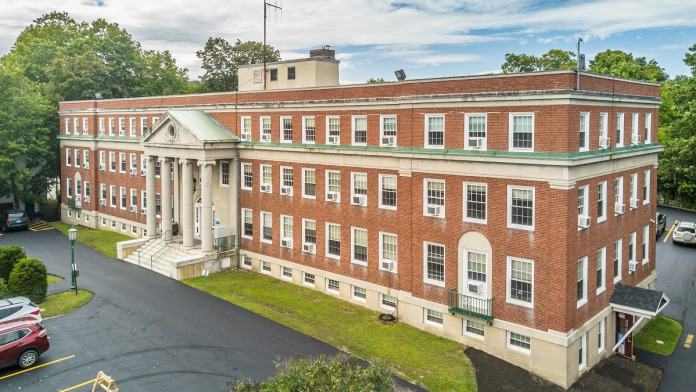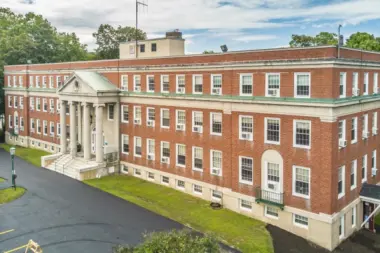About Maine Pretrial Services Inc
Maine Pretrial Services, Inc. (MPS) has been supporting individuals involved in the criminal justice system for more than 35 years. Originally incorporated as the Bail Project, MPS offers pretrial services, post-conviction alternatives and diversion programs across the state of Maine. They primarily serve individuals who face criminal charges but are better supported through community-based supervision, rather than incarceration.
Pretrial services at Kennebec County include veterans and co-occurring disorders court, family treatment drug court and regional reentry program. These programs are housed on Green Street in Augusta, Maine.
Maine Co-Occurring Disorder Court (MCODC)
MCODC is a specialized jail-diversion docket for adults diagnosed with both substance use issues and mental health challenges. The program primarily serves individuals at moderate to high risk of reoffending who are willing to participate. Referral is accepted from family members and all branches of the criminal justice system.
This program offers tailored therapeutic support that helps clients manage symptoms and build healthier coping strategies, following a screening and intake assessment. Therapists use proven methods like cognitive behavioral techniques and moral reconation to address criminogenic risks and individual needs.
Clients attend weekly hearings before the presiding justice and court team to review progress, reinforce accountability and adjust support as needed. Frequent and random urinalysis helps monitor progress and compliance with treatment guidelines. Forensic case managers assist clients in meeting personal needs like housing, education and employment.
Family Treatment Drug Court (FTDC)
FTDC supports families negatively impacted by substance dependence, particularly those whose children have been removed due to abuse or neglect related to parental drug or alcohol use. Most of the families served have open DHHS Child Protective Services cases. The program is voluntary and blends accountability with increased access to therapeutic support, fostering positive behavioral changes and long-term abstinence.
Emphasis is placed on improving the safety and welfare of children through effective interventions that may lead to reunification. FTDC helps to reduce reoffending and also enhances parenting skills.
Rehab Score
Gallery


Other Forms of Payment
Private insurance refers to any kind of healthcare coverage that isn't from the state or federal government. This includes individual and family plans offered by an employer or purchased from the Insurance Marketplace. Every plan will have different requirements and out of pocket costs so be sure to get the full details before you start treatment.
Self-pay involves paying for treatment out of your own pocket. You can use savings or credit, get a personal loan, or receive help from family and friends to fund your treatment. If you don't have insurance or your insurance plan doesn't cover a specific program, self-pay can help ensure you still get the care you need.
Financial aid can take many forms. Centers may have grants or scholarships available to clients who meet eligibility requirements. Programs that receive SAMHSA grants may have financial aid available for those who need treatment as well. Grants and scholarships can help you pai for treatment without having to repay.
Medicaid is a state based program that helps lower-income individuals and families pay for healthcare. Medicaid covers addiction treatment so those enrolled can use their coverage to pay for rehab. When a program accepts Medicaid the client often pays very little or nothing out of their own pocket.
Medicare is a federal program that provides health insurance for those 65 and older. It also serves people under 65 with chronic and disabling health challenges. To use Medicare for addiction treatment you need to find a program that accepts Medicare and is in network with your plan. Out of pocket costs and preauthorization requirements vary, so always check with your provider.
Addiction Treatments
Levels of Care
Outpatient Programs (OP) are for those seeking mental rehab or drug rehab, but who also stay at home every night. The main difference between outpatient treatment (OP) and intensive outpatient treatment (IOP) lies in the amount of hours the patient spends at the facility. Most of the time an outpatient program is designed for someone who has completed an inpatient stay and is looking to continue their growth in recovery. Outpatient is not meant to be the starting point, it is commonly referred to as aftercare.
Clients entering inpatient rehab can expect to engage in intensive daily treatment, focusing principally on addiction counseling. Inpatient programs generally offer a range of psychotherapeutic options, including CBT, DBT, RBT, and motivational interviewing. Many also prioritize group and family counseling as well as one-on-one therapy. Many inpatient programs also include extensive addiction education and evidence-based holistic therapies, such as meditation and creative arts therapy.
Intensive Outpatient Programs (IOP) are for those who want or need a very structured treatment program but who also wish to live at home and continue with certain responsibilities (such as work or school). IOP substance abuse treatment programs vary in duration and intensity, and certain outpatient rehab centers will offer individualized treatment programs.
Rehab aftercare programs facilitate continuity of care for clients transitioning out of inpatient treatment. In addition to outpatient counseling, recovery education, and other forms of care, services typically include peer coaching, relapse prevention, career counseling, and 12 step program induction. Clients often continue to receive support after being discharged from formal outpatient treatment. Case managers and care teams may provide medical, mental health, and social service referrals as a part of the clients' rehab aftercare service plan.
Treatments
The goal of treatment for alcoholism is abstinence. Those with poor social support, poor motivation, or psychiatric disorders tend to relapse within a few years of treatment. For these people, success is measured by longer periods of abstinence, reduced use of alcohol, better health, and improved social functioning. Recovery and Maintenance are usually based on 12 step programs and AA meetings.
Drug rehab in Maine is the process of helping someone learn how to live without the use of substances. Professional staff provide treatment to address the various issues of addiction. Methods often involve medication, counseling, and evidence-based therapies.
Many of those suffering from addiction also suffer from mental or emotional illnesses like schizophrenia, bipolar disorder, depression, or anxiety disorders. Rehab and other substance abuse facilities treating those with a dual diagnosis or co-occurring disorder administer psychiatric treatment to address the person's mental health issue in addition to drug and alcohol rehabilitation.
A combined mental health and substance abuse rehab has the staff and resources available to handle individuals with both mental health and substance abuse issues. It can be challenging to determine where a specific symptom stems from (a mental health issue or an issue related to substance abuse), so mental health and substance abuse professionals are helpful in detangling symptoms and keeping treatment on track.
Opioid rehabs specialize in supporting those recovering from opioid addiction. They treat those suffering from addiction to illegal opioids like heroin, as well as prescription drugs like oxycodone. These centers typically combine both physical as well as mental and emotional support to help stop addiction. Physical support often includes medical detox and subsequent medical support (including medication), and mental support includes in-depth therapy to address the underlying causes of addiction.
Programs
Adult rehab programs include therapies tailored to each client's specific needs, goals, and recovery progress. They are tailored to the specific challenges adult clients may face, including family and work pressures and commitments. From inpatient and residential treatment to various levels of outpatient services, there are many options available. Some facilities also help adults work through co-occurring conditions, like anxiety, that can accompany addiction.
Young adulthood can be an exciting, yet difficult, time of transition. Individuals in their late teens to mid-20s face unique stressors related to school, jobs, families, and social circles, which can lead to a rise in substance use. Rehab centers with dedicated young adult programs will include activities and amenities that cater to this age group, with an emphasis on specialized counseling, peer socialization, and ongoing aftercare.
Clinical Services
Research clearly demonstrates that recovery is far more successful and sustainable when loved ones like family members participate in rehab and substance abuse treatment. Genetic factors may be at play when it comes to drug and alcohol addiction, as well as mental health issues. Family dynamics often play a critical role in addiction triggers, and if properly educated, family members can be a strong source of support when it comes to rehabilitation.
Group therapy is any therapeutic work that happens in a group (not one-on-one). There are a number of different group therapy modalities, including support groups, experiential therapy, psycho-education, and more. Group therapy involves treatment as well as processing interaction between group members.
In individual therapy, a patient meets one-on-one with a trained psychologist or counselor. Therapy is a pivotal part of effective substance abuse treatment, as it often covers root causes of addiction, including challenges faced by the patient in their social, family, and work/school life.
Life skills trainings involve all the skills a person must have in order to function successfully in the world. These include time management, career guidance, money management, and effective communication. Truly successful addiction recovery is based on the ability to not only live substance-free, but to thrive. Life skills teaches the practical necessities of functioning in society, which sets clients up for success in life, and therefore sobriety.
Amenities
-
Residential Setting
Staff
Richard Bryant
Board Chair, Board of Director
Catherine Chichester
Board Member
Norman Croteau
Board Member
Donald Hornblower
Board Member
Bruce Noddin
Board Member
Contact Information
9 Green Street
Suite 3-A
Augusta, ME 04330